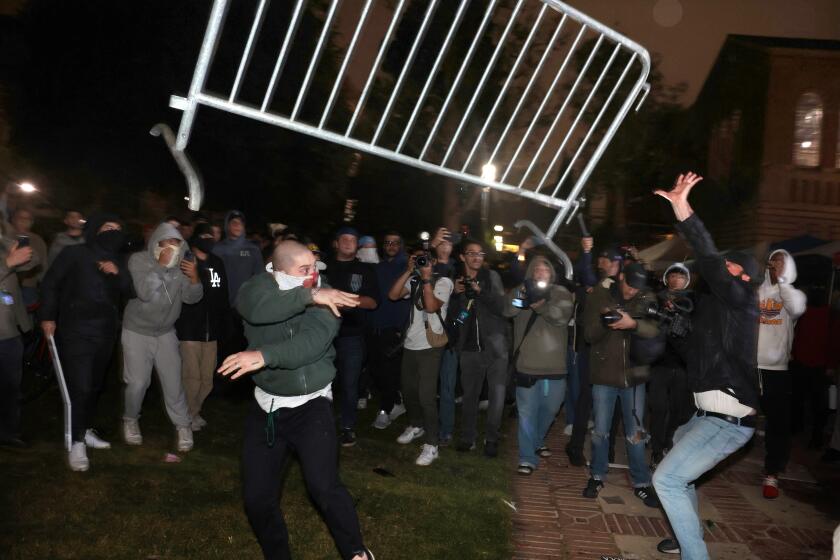No time like the present to fix the Sheriff’s Dept.

The 10-month gap between Sheriff Lee Baca’s departure at the end of this month and the swearing-in of his elected successor in December should be a time of decisive action, not a ponderous waiting period or quiet intermission. Problems in the Los Angeles County Sheriff’s Department are deep and require immediate attention. Baca’s unexpected but welcome resignation creates an unusual opportunity, before the arrival of an elected sheriff, to lock in badly needed reforms.
Even as candidates campaign for the job and deputies wonder who their next leader will be, there is an existing diagnosis of the department’s problems and an agenda for fixing them. Both are set out, in part, in the September 2012 report of the Citizens’ Commission on Jail Violence.
Baca agreed to most of the commission’s recommendations, including separating the custody and patrol divisions of the Sheriff’s Department and opening its operations to an inspector general. But the department has yet to acknowledge that there are cultural or systemic problems that led to its current situation: deputies charged with violence against inmates and visitors, shoddy hiring practices, numerous lawsuits, Baca’s resignation under fire, and the entire operation the butt of scornful jokes among law enforcement professionals outside the county.
The Board of Supervisors should appoint an interim sheriff for the next 10 months who embraces not just the marching orders of reform but the underlying need for real change. Such a person must be prepared to root out an entrenched attitude of resistance. He or she must be prepared to face and overcome deputies and supervisors who believe they can wait out any departmental revamp.
If the Sheriff’s Department needs a housecleaning — and it does — now is the time. Proven dishonesty should result in discharge, and supervisors uncomfortable with scrutiny and new structures of accountability should be moved aside. An interim sheriff who fires and demotes as the situation requires may well be unpopular, but that’s the point: As a short-term appointee, he or she can and should take steps that might give pause to someone seeking election or reelection.
The interim sheriff should make clear in both word and deed that dishonesty — as opposed to personal disloyalty — will be punished. Honest deputies must see that deceit will be found out and punished. If there is a jailhouse code of silence meant to protect deputies and enable the abuse of inmates, it must be eliminated. An unyielding stance against secretive conduct and deception should be adopted by the interim sheriff and should be considered nonnegotiable by the time the elected sheriff takes office.
Mechanisms to ensure transparency and accountability that will transcend and outlast any single person’s leadership must be put in place. There is already an inspector general to monitor and report on jail conditions and the use of force, and to conduct its own investigations, and that’s a good start, but more is needed.
The Board of Supervisors has before it a motion to create a five-member oversight commission. The idea is not perfect; unlike the commission that oversees the Los Angeles Police Department, this one would have no actual authority over an independently elected sheriff. But it would be one way to provide a forum for the inspector general to publicly report on his findings and for the sheriff to respond. That’s a more useful format than weekly Board of Supervisors hearings currently provide.
An interim sheriff should establish a pattern of accountability by appearing regularly before the board — or before the oversight commission, if the board moves forward with that plan — and responding to inspector general reports. Candidates for sheriff should pledge to do the same if elected, and should promise to push for any required state constitutional changes that would give such an oversight commission actual power to compel production of documents and administer discipline as appropriate. If they don’t support the creation of the commission, candidates should present their own plans for oversight and accountability that would meet or exceed the standard set by such an empowered commission.
The Board of Supervisors and sheriff’s officials should continue, and step up, separation of the department’s custody operations from its patrol functions. They should publicly acknowledge, in a way they have yet to do, that the training and skills required of patrol officers in the county’s unincorporated areas and in cities and agencies that contract for the sheriff’s services are fundamentally different from what is required from professional jail officers.
The interim sheriff should demonstrate by his or her actions — and candidates for sheriff should make clear on the campaign trail — that the department is far more than a police agency. The sheriff of Los Angeles County should be the most important figure in California in reinventing not just the local jail system but the entire criminal justice system. The sheriff should be committed to programs and policies that ensure that inmates, whether awaiting trial or serving sentences, do not leave jail the same way they went in. The sheriff should be the champion of reentry programs to ensure a safe and successful return to society, and an advocate for constantly improving systems to assess an inmate’s danger to society and amenability to reform. The interim sheriff should plan to press the Board of Supervisors for greater resources for reentry programs and policies and not just more jail beds. An interim sheriff should lead the charge to make the state’s criminal justice “realignment” process work and not merely complain about the burdens it places on the department. Candidates for the permanent job should do the same.
More to Read
A cure for the common opinion
Get thought-provoking perspectives with our weekly newsletter.
You may occasionally receive promotional content from the Los Angeles Times.






